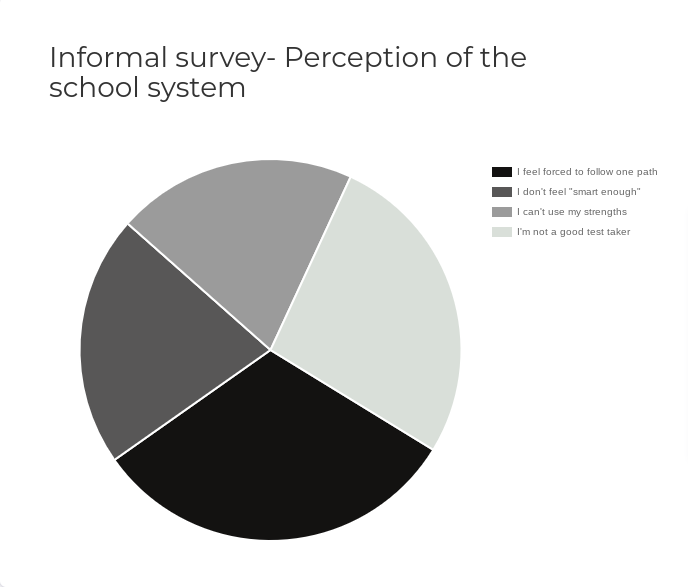As a junior in high school, college has become something I hear discussed each day: touring nearby colleges, taking the SAT, researching schools. But this has also thrown me
into a world that leads me to believe that should I fail a single test, I will not be successful later in my life.
This stigma is extremely prevalent, but also extremely outdated and flawed, as it presents the image that being ‘smart’ or ‘capable’ only falls under one umbrella.
In an informal survey, more than half of surveyed San Marin students said that they
believe the education system is flawed; nearly half said that they do not feel ‘smart’ or
‘good enough’ as a result of the current system.
Last school year, I took AP European history; it was my first AP course in my high school career. All throughout the year, I did all right on the tests, whether this was getting a B or merely passing with a C. But the actual AP test was a different story. The questions and writing prompts were extremely difficult, and I found myself constantly asking, “Why am I expected to know this?”
This thought has carried over into my junior year. I cannot fathom why my peers and I are expected to take multiple four to five hour long tests and all we receive is a number: a number that does not just score how well you did, but reveal how “smart” you are as a whole.
Furthermore, we will never have the chance to reflect and learn from our mistakes; we only see the score, not the test itself. Seeing the test would afford us the opportunity to look at which answers we got wrong and which answers we got right and to learn more.
Standardized tests are immensely confining, and do not permit students to display a different part of themselves that cannot be tested on a piece of paper. I believe that we have forgotten how to appreciate individuality. Every person has something unique to offer, something to enhance the world. But how can we benefit in this way if all we ever do is look at test scores?
And this is not the only place in school that numbers and scores define our capability. Every high school student an agree that exceptional grades are ideal, but we have reached a point far past simply “ideal.” We are expected to get a 4.0 GPA, straight A’s, and take as many APs as possible, but these expectations are irrational and difficult to fulfill.
I can tell that I am not the only one who is tense; my peers have expressed concerns just as strong as mine. More than half of surveyed students reported that they feel forced to follow one path, with no room to make their own decisions and no way to pursue an individualized future.
A study performed by College Board senior director Michael Hurwitz and doctoral student Jason Lee revealed the severe inflation of average grades among high school
students. Between 1998 and 2016, the number of seniors with an A average within their class increased from 38.9 percent to 47 percent. Although grades increased, average SAT
scores dropped from 1,026 to 1,002.
This study is proof that we are ignoring strengths that cannot be measured on a scale or categorized under math, English, science or history. It is also proof that we are not learning with this current system; we only get the grades that are expected in order to please authority.
The education system is failing our students, myself included. I vividly remember the day I got my AP European history test score back; I had not even passed. My first thought was “I am never going to be successful.”
And I have no desire to pursue history, in any regard. We must begin to find a solution that utilizes every strength and breaks the stigma that being smart is solely being book
smart. Because being smart is so much more than that.






































